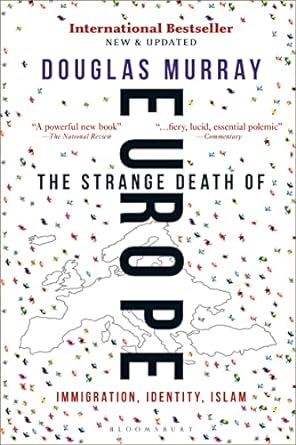A Brief Book Summary from Books At a Glance
by Benjamin J. Montoya, PhD
About the Author
Douglas Murray is a regular columnist for both the Spectator and Standpoint and writes frequently for a variety of other publications, including the Sunday Times and Wall Street Journal. A prolific debater, Douglas has spoken on a variety of prominent platforms, including at the British and European Parliaments and the White House.
Introduction
Europe has experienced an ironically strange death of sorts; while people bemoan the change their countries have seen, they have brought this transformation upon themselves while politicians and the like have celebrated their way to this point. What is this strange death? How did it start? Why can’t people even speak or publish about it without fear of violence? What is next from here? Consider our summary to learn more.
Table of Contents
Chapter 1 The beginning
Chapter 2 How we got hooked on immigration
Chapter 3 The excuses we told ourselves
Chapter 4 ‘Welcome to Europe’
Chapter 5 ‘We have seen everything’
Chapter 6 Multiculturalism
Chapter 7 They are here
Chapter 8 Prophets without honour
Chapter 9 Early-warning sirens
Chapter 10 The tyranny of guilt
Chapter 11 The pretence of repatriation
Chapter 12 Learning to live with it
Chapter 13 Tiredness
Chapter 14 We’re stuck with this
Chapter 15 Controlling the backlash
Chapter 16 The feeling that the story has run out
Chapter 17 The end
Chapter 18 What might have been
Chapter 19 What will be
Summary
Chapter 1: The Beginning
The beginning of the strange death of Europe started with at least two primary cultural changes. First, the political change toward immigration started with a policy change that unopened up the door for immigration in a way that has proven itself incapable of being shut. There were a handful of political changes that opened the door for immigration in England. Immigration is certainly not a bad thing, but these acts so opened the doors of the country, such that droves of people from other countries poured in. When politicians began to speak up against some of these political policies, they found themselves with so much backlash that some saw the end of their political careers. The harsh backlash made it more than possible for subsequent politicians to excuse themselves from these kinds of discussions in toto.
Second, the religious environment has changed in Britain as well as across Europe. Christianity is now far from being mainstream, such that many of the major cultural institutions are assumed to be secular. This is quite different from what used to be the case in countries like Britain. Many of these countries have lots of architecture and all kinds of historical connections to Christianity.
Chapter 2: How We Got Hooked on Immigration
After the Second World War, immigration began to happen in a new way. Countries began to hire workers from other countries, and people began to immigrate more rapidly. It is as if immigration spiked. Politicians have consistently voiced concerns about immigration, but they have been shunned and told to focus more on the “integration” of these immigrants than anything else, even when the mass amount of immigration has caused a variety of issues.
Despite getting hooked on immigration over time as it continued to increase, there has been little reflection on some of the immigration issues. First, given the cultural views of some cultures and religions toward women, primarily non-Muslim women, from certain Islamic gangs, there has been an increase in gang-rapes and gang-related activities. Second, there has also been a loss of what could be called “our culture” in a nation; when it becomes so diverse, any sense of a national culture is lost. Third, this massive increase in immigration and its subsequent challenges become thought of as normal when they are not. The increase in terrorism and gang rapes are never normal activities. Fourth, politicians still get derided for even trying to discuss the issue, to the point that people can no longer even reflect on the predictions of politicians from the past who predicted the kinds of issues that would arise from increased immigration. . . .
[To continue reading this summary, please see below....]The remainder of this article is premium content. Become a member to continue reading.
Already have an account? Sign In
